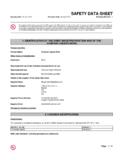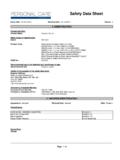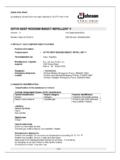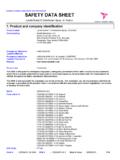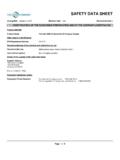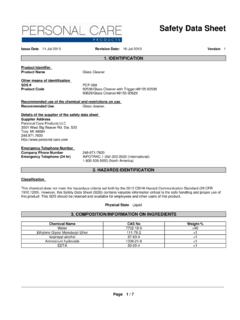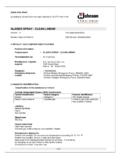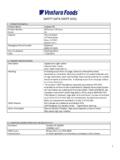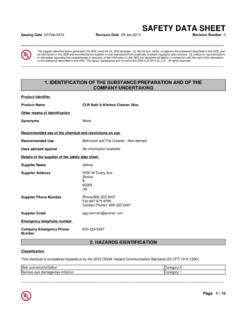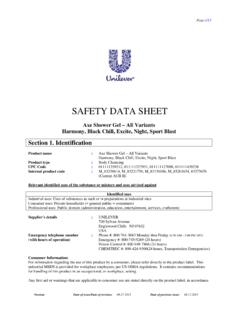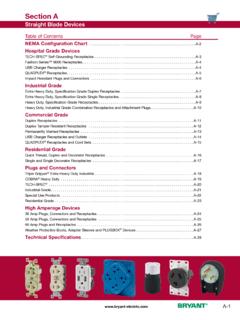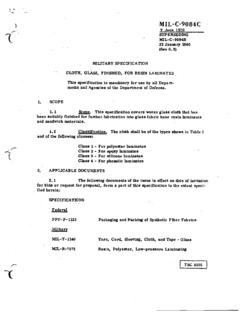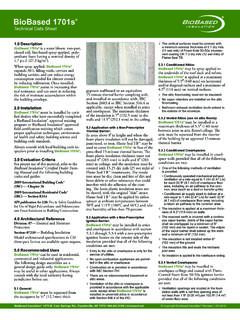Transcription of SAFETY DATA SHEET (SDS) - GJ Food
1 SAFETY data SHEET (SDS). 1. Product Description Product Name Canola Oil Product Number All 100% Canola Oil items Brand All Supplier Ventura Foods 40 Pointe Drive Brea, CA 92821. 800-421-6257. Emergency Phone Number Chemtrec (800) 424-9300. Use of substance Food ingredient Date 5/22/2015. 2. HAZARD IDENTIFICATION. Description Appearance: Light yellow Physical State: Liquid Odor: Slight vegetable oil Handling If smoking occurs from oil usage, reduce or remove from heat. Spontaneous combustion (fire) may result from oil soaked materials such as rags, steel wool, paper and clothing. Place soaked materials in a sealed, metal container to prevent this. If smoking occurs from oil usage, reduce or remove from heat.
2 This product is NOT classified as hazardous according to CFR 1910, amended to conform to the United Nations' Globally Harmonized System of Classification and Labeling of Chemicals (OSHA / GHS); SOR/88-66, the Canadian Controlled Products Regulations (CPR); and/or NOM-002-SCT- 2003 (Mexico). However, vegetable oil (in mist form) is known to be listed as an OSHA 29 CFR Air Contaminant. Occupational exposure limits are subsequently provided in section 8 of this SDS. OSHA Hazards No known OSHA hazards. Not a dangerous substance according to GHS. HMIS Classification Health: 0. Flammability: 1. Physical Hazard : 0. NFPA Rating Health: 0. Fire: 1. Reactivity: 0.
3 Potential Health Effects Inhalation: May be harmful if inhaled. May cause respiratory tract irritation. Skin: May be harmful if absorbed through skin. May cause skin irritation. Eyes: May cause eye irritation. Ingestion: Food ingredient. Not a hazardous substance. 1. 3. COMPOSITION/INFORMATION ON INGREDIENTS. Synonyms Canola Oil CAS#8002-13-9. GRAS status All ingredients are FDA GRAS. Hazard status No food ingredients are hazardous according to OSHA criteria. 4. FIRST AID MEASURES. Inhalation Move to fresh air in case of accidental inhalation of vapors or decomposition products. Skin contact Wash off with soap and plenty of water. Eye contact Flush eyes with water of special eyewash solution.
4 If swallowed Ingestion of edible vegetable oil is nontoxic and should pass through the system. 5. FIREFIGHTING MEASURES. Conditions of flammability Materials may pose fire hazard. Suitable extinguishing media Alcohol resistant foam, dry chemical or carbon dioxide. Use extinguishing measures that are appropriate to local circumstances and the surrounding area. Special protective equipment for Wear self-contained breathing apparatus for firefighting if necessary. firefighters Specific hazards arising from the Risk of ignition. Rags and other materials containing this product may Chemical Oil heat up and spontaneously ignite if exposed to air. Store wiping rags and similar materials in metal cans with tightly fitting lids.
5 Cool closed containers exposed to fire with water spray. Avoid hot oil; if smoking occurs during application reduce or remove from heat. Hazardous combustion products Hazardous decomposition products formed under fire conditions. Nature of decomposition products not known. NFPA Health 0. NFPA Stability and Reactivity 0. NFPA Flammability 1. NFPA Physical Hazard 0. 6. ACCIDENTAL RELEASE MEASURES. Personal Protection Avoid breathing vapors, mist or gas. Recommend exhaust fans over grills and deep frying. Environmental Precautions Prevent further leakage or spillage. Do not allow product to reach soil, sewage or any water sources. Dispose per local, state, and federal regulations.
6 Methods and materials for Keep in suitable, closed containers for disposal. Dispose of rags used in containment and cleaning up clean up. Remember oil soaked rags or partially cleaned materials may spontaneously combust. 7. HANDLING AND STORAGE. Conditions for safe storage Ensure adequate dry, well ventilated storage area between 50 120F. Clean up any spillage to avoid accidents immediately. Combustible conditions Keep away from open flames, hot surfaces and sources of ignition. 2. 8. EXPOSURE CONTROLS/PERSONAL PROTECTION. Occupational exposure limit values Contains no substances with occupational exposure limited values. PPE: Respiratory protection Respiratory protection not required.
7 For nuisance exposures use type OV/AG or type ABEK respiratory cartridges. Hand protection Handle with gloves. Gloves must be inspected prior to use. Use proper glove removal technique to avoid skin contact with this product. Dispose of contaminated gloves after use in accordance with applicable laws and good laboratory practices. Wash and dry hands. Eye protection Use equipment for eye protection tested and approved under appropriate government standards such as NIOSH (USA) and EN 166 (EU). Oil in eye must be flushed with water or special first aid eye wash continuously. Skin and Body protection Impervious clothing. The type of protective equipment must be selected according to the concentration and amount of the dangerous substance at the specific workplace.
8 Deep frying or grill operator must use nonabsorbent apron when dealing with hot oil. Hygiene measures Good industrial hygiene practices. 9. PHYSICAL AND CHEMICAL PROPERTIES. Form Clear liquid Color Very light yellow pH NA. Specific gravity (H20 = 1). Melt point/freezing point NA. Smoke point >430-450F. Flash point >527F. Ignition temperature >625F. Auto-ignition Not auto flammable Lower explosion limit No data available Upper explosion limit No data available Vapor pressure <.1mm Hg at 300C. Boiling point No data available Water solubility Insoluble Partition coefficient No data available Relative vapor No data available Density No data available Odor/Flavor Slight vegetable oil odor Odor threshold No data available Evaporation rate <1 (butyl acetate = ).
9 10. STABILITY AND REACTIVITY. Chemical stability Stable under recommended storage conditions (<120F). Baking temperature >440F, oil may smoke. Reduce or remove from heat. Possibility of hazardous reaction None known. Conditions to avoid None known. Materials to avoid Strong oxidizing agents. Hazardous decomposition products Formed under fire conditions nature of decomposition not known. 3. Other decomposition products no data available Rags used for clean-up (clean or contaminated) can combust if conditions are adequate. Keep in safe place or dispose of rags after usage in an enclosed metal container. 11. TOXICOLOGICAL INFORMATION. Acute toxicity Oral: LD50 no data available.
10 Inhalation: LC50 no data available. Dermal: LD50 no data available. Skin corrosion No data available. Serious eye damage No data available. Respiratory or skin sensitization No data available. Carcinogenicity IARC No component of this product present at levels greater than or equal to is identified as probable, possible, or confirmed carcinogenic by IARC. Carcinogenicity ACGHI No component of this product present at levels greater than or equal to is identified as probable, possible, or confirmed carcinogenic by ACGIH. Carcinogenicity NTP No component of this product present at levels greater than or equal to is identified as probable, possible, or confirmed carcinogenic by NTP.
